Hello, it’s me, a misandrist lesbian born to a Quaker father and a Jewish mother, here to talk to you about the shocking religion-related results of our Lesbian Stereotypes Survey.
Namely, YOUR LACK OF RELIGION. First, a confession (get it? that’s a religion joke!): I wish I’d asked more questions than I did on this survey! I was trying to keep it as short as possible ’cause I was hoping to get at least 5k responses. We ended up getting so many (over 12k) that now I realize I could’ve asked a lot more questions about your religious beliefs and practices than I did.
This survey was conducted by soliciting participants via Autostraddle.com, so it was self-selecting and not a random sample. These are the demographics of the group that turned up:
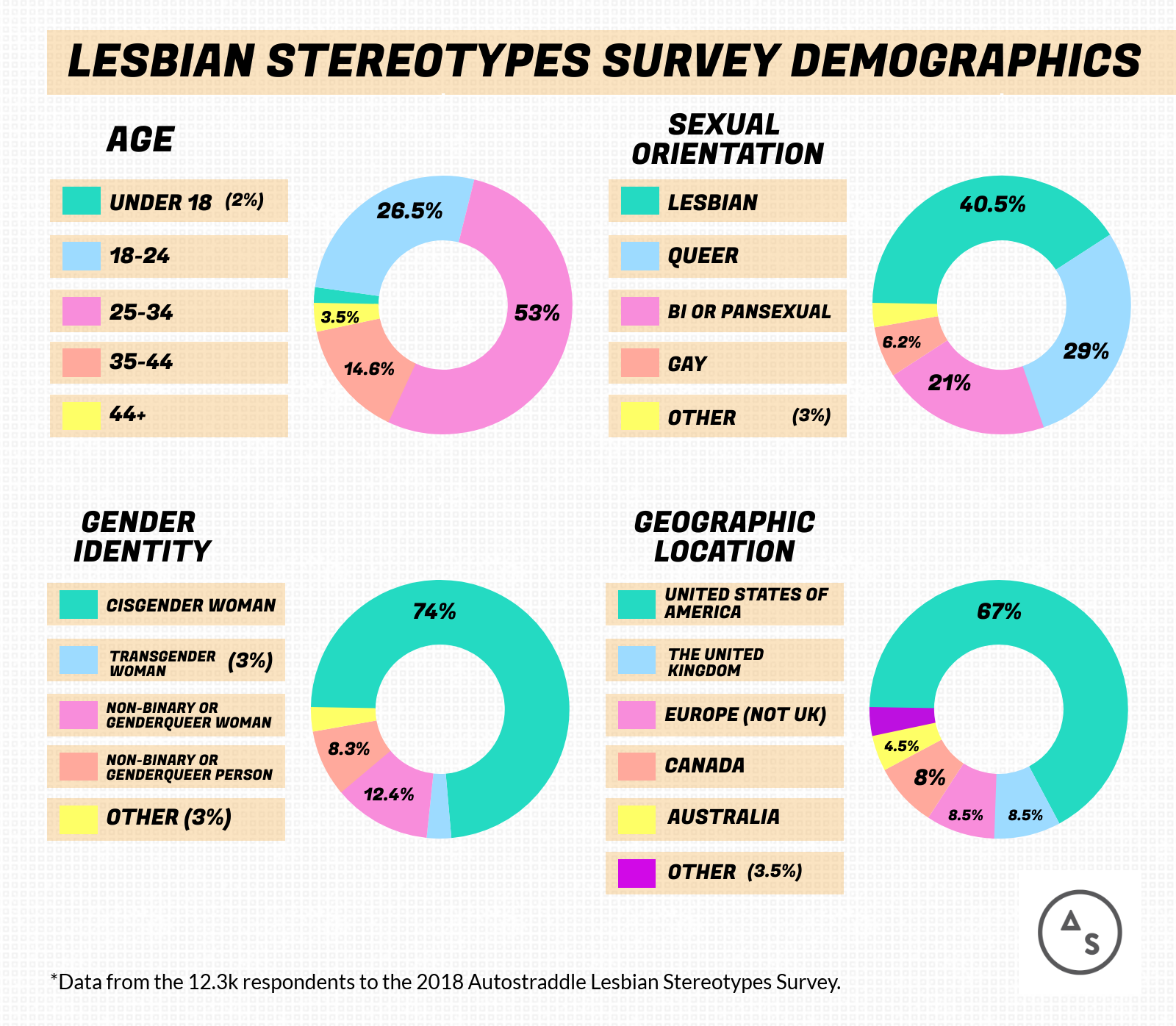
How Religious Are We?
In order to answer this question, I compared our data to data from the exhaustive hotbed of information assembled by The Pew Forum’s Religious Landscape Study, most recently conducted in 2014. As you can see, we are not quite as Christian as the rest of this fine country:
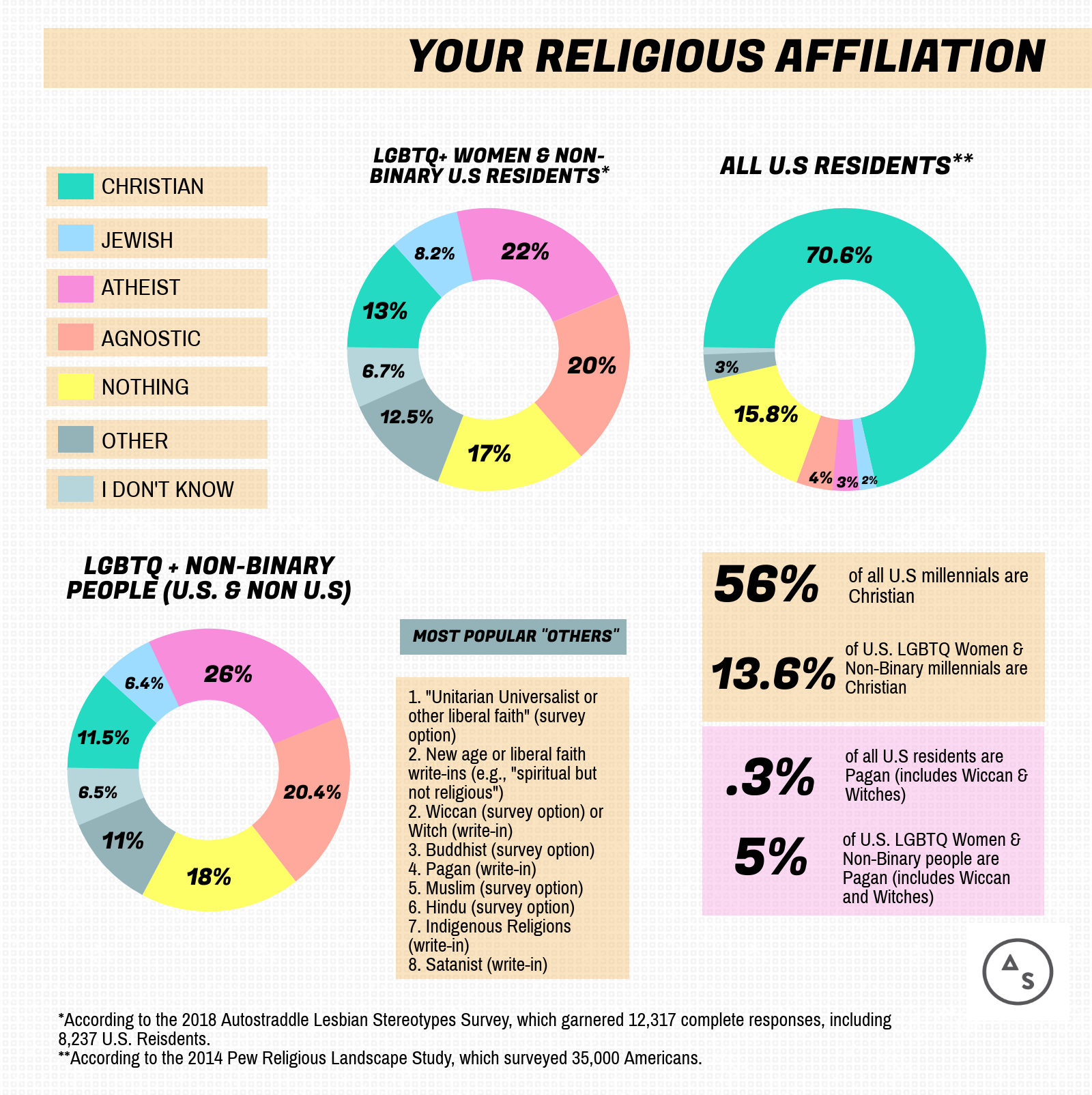
Here are the numbers for the other Commonwealth countries with significant showings on the Survey, assembled using statistics from the Australian Bureau of Statistics, the British Social Attitudes Survey and the National Canadian Household Survey:
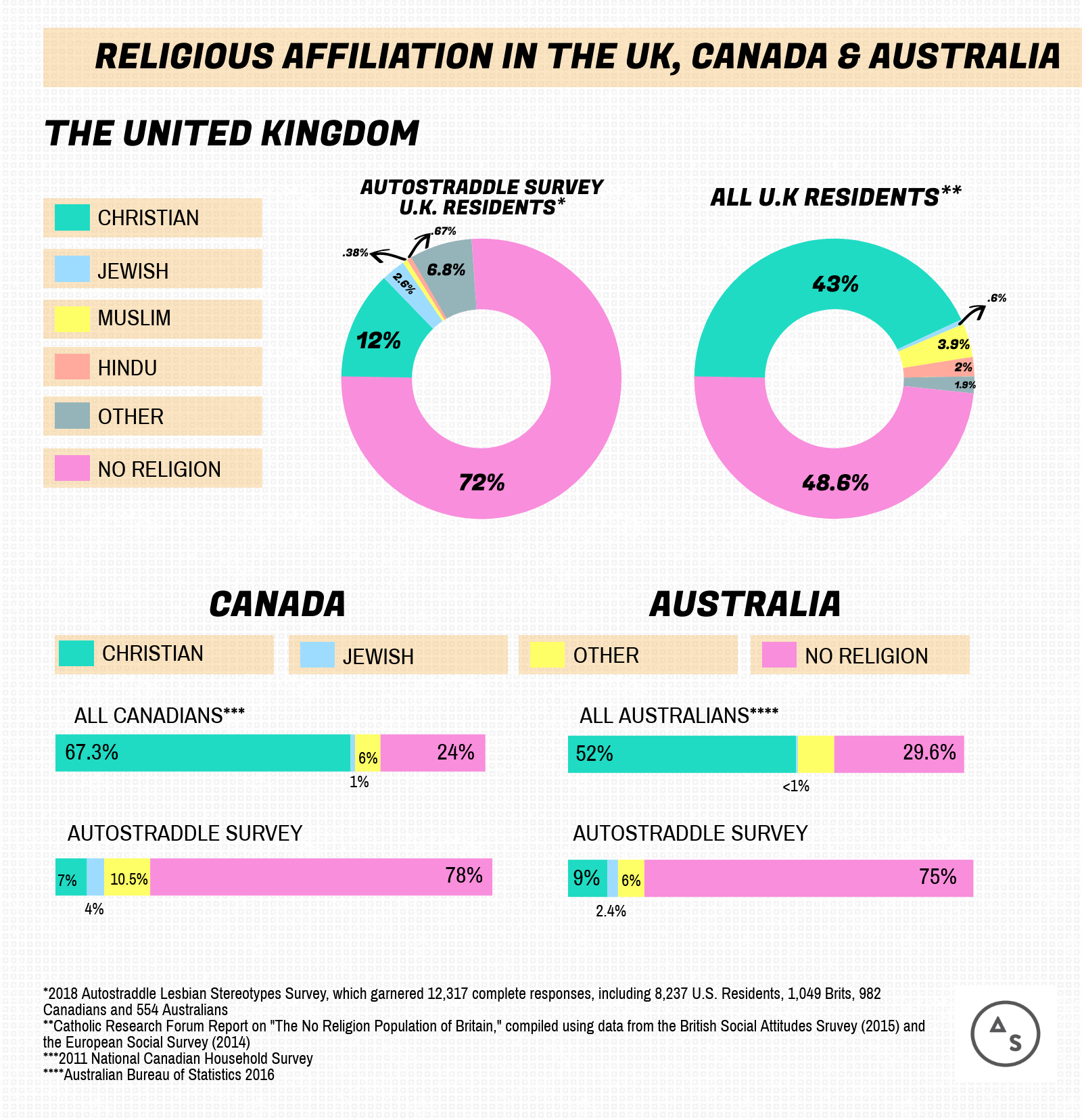
As you can see, we are falling behind when it comes to some organized religion all over the world! We are, however, maintaining a mysterious abundance of Jews. (I’m Jewish so I’m allowed to say things like “mysterious abundance of Jews.”)
![]()
The Limit For This Sample Does Exist
We’ve written quite a bit about religion on Autostraddle, although the bulk of it, especially during the first five years of our existence, have been about conservative Christian groups trying to ruin our lives. But we’ve told personal stories, too. We did a roundtable that includes people raised in Jewish, Mormon, Hindu, Muslim, Catholic, Southern Baptist and Methodist households. We’ve done fun articles about queering Jewish holidays, how to support your Muslim friends during Ramadan, finding a “Muslim RuPaul” and how to love your neighbor and yourself by reading the Bible for Pride. Al and Audrey, who are both practicing Christians, have written heartwarming and complicated pieces on their relationships to the church. Yvonne and Mey have written about spaces within Catholic traditions they’ve carved out for themselves. But we’ve also done a lot about leaving or struggling with religion — escaping Christofascism, divorcing Jesus to love sex, Twitter providing a “black church” feeling not found in actual black church, feeling like a “bad Muslim” for being attracted to women, feeling God’s love as unrequited, a Mormon upbringing engendering internalized racism — it goes on and on and on. Queer people — and women and trans people! — have distinctly complicated and difficult relationships to organized religion generally, and, at least in the U.S., Christianity specifically.
In most cases, the sheer volume of responses garnered makes it easy to draw some conclusions from our survey about LGBTQ+ women and non-binary people on the whole, but when it comes to religion, that might not be true. It’s possible that involvement in a highly conservative or orthodox religious group necessarily sidesteps the possibility a person might be on this website to begin with, let alone be divulging their cat feelings to Surveymonkey. Pew collected data on religious identification of 1,197 LGBTQ+ people in 2013 — and their results turned up similar, but not identical trends. 48% of their group said they had no religious affiliation, compared to 59% of ours.
FYI, when I mention “the Pew group” in this post, I’m talking about their entire Religious Landscape Survey unless I specify the “Pew LGBT Survey.”
Another distinct and relevant thing about our group that is not intrinsic to queer people is that 84.6% of our 25+ survey-takers have at least a Bachelor’s Degree, compared to 31% of Americans on the whole and 34% of LGBT people in general. Even more unusual is that 37% of our survey-takers have a master’s or professional degree, compared to 11.3% of all Americans. This matters because of what Pew determined about Christianity, Atheists, Agnostics and educational attainment: “while college graduates are more likely than others to describe themselves as atheists or agnostics and less likely to identify with Christianity… they are not, on the whole, much less likely than others to identify with any religion.”
Our group skews young, and Pew has determined that “religious congregations have been graying for decades, and young adults are now much less religious than their elders,” so I broke out the data by age to see if that lessened the disparities. Although reducing the generational spread made Pew’s numbers go down, ours actually go slightly up.
56% of millennials on the Pew Survey are some sort of Christian, compared to 14% of 18-to-34-year-olds on our survey. 77% of Baby Boomers on the Pew Survey are Christains, compared to… 13.7% of our survey-takers over 45. This could just be specific to Autostraddle readers, or it could reflect Christianity being less hospitable to LGBT people when the Baby Boomers were growing up than it is now.
Religions that became more popular in older groups were those that, in the United States, one is more likely to choose to join rather than to be raised in. 5.7% of 45+ survey-takers are Buddhist, compared to 1.6% of the entire group. (73% of American Buddhists are converts.) On Pew’s survey, Buddhism gets less popular with age and never surpasses 1%. Furthermore, 23% of survey-takers over 45 are Unitarian Universalist or another liberal faith or of a “New Age” religion or practice, compared to 9% of the entire group.
![]()
They Gotta Have (Other) Faiths
Although we’re dramatically less likely to be Christian than Americans on the whole, we’re way more likely to be Jewish or to ascribe to a variety of religions that are extremely unpopular for the majority of Americans! This was true with Pew’s analysis of LGBT populations as well.
The options on Pew’s survey, which I replicated on our survey, were:
- Christian (Evangelical Protestant, Mainline Protestant, Historically Black Protestant, Catholic, Mormon, Orthodox Christian, Jehovah’s Witness, Other Christian)
- Non-Christian Faiths (Jewish, Muslim, Buddhist, Hindu, Other World Religions)
- Other Faiths (Unitarians and other liberal faiths, New Age, Native American Religions)
- Unaffiliated (Atheist, Agnostic)
- Nothing in Particular
- Don’t Know
The only change on our survey is that I added “Wiccan” to our list of options because of how many Wiccans yelled at me last time we did a religion survey. There was also an “Other” box for write-in answers, which I then categorized manually into existing categories.
So let’s look at how Pew categorized some of the less popular faiths on their survey. Before we do, I just wanna say that I feel like some of what they’ve called a “liberal faith” might more accurately be “new age,” but this is the edict that Pew has passed down to us in a dense cloud. I’m just the messenger, otherwise known as “the prophet.” In this metaphor, Pew is god. Here’s what Pew has deemed right and just upon us:
New Age Religions: includes Pagan or Wiccan practices. Paganism encompasses spiritualities like Druidism, Hellenism and Discordianism.
Unitarian Universalist or other liberal faiths: includes “Spiritual but not religious,” Humanist, Deist, “Eclectic, a bit of everything, or I have my own beliefs.”
Native American / Indigenous Religions
1.5% of Pew’s sample ascribed to any of the above faiths or practices — but 9% of our entire sample did.
![]()
Our Other Religions / Spiritualities
Y’all brought a true spiritual buffet to the table in the “other” write-in section of the survey. Within it, I found an abundance of Jewish Atheists or those identifying as culturally, but not religiously, Jewish. We had ourselves some Ex-Muslims, Ex-Mormons and Recovering Catholics, as well as people using the “other’ section to say things like “Why wasn’t atheist an option?” even though it was, or writing in “Quaker” which technically, according to Pew at least, falls under Mainline Protestant (Although I did separate out those who specified “Quaker but not Christian”), as does Anglican and Episcopalian, which were also popular write-ins.
Very many people noted that they were “witches, but not Wiccan.” There were quite a few practitioners of indigenous religions, a lot of people who find spirituality in mother earth, and many who wanted to “fuck Religion.”
Before I get into the religious laundry list, note that I’m not a religious scholar by any means, and therefore will probably get things wrong! Please correct me in a manner that could be described as kind, tenderhearted, and forgiving, as surely G-d has forgiven you for your trespasses.
Paganism — which in the modern era generally recognizes a plurality of divine beings, has a concept of the divinity of nature, and recognizes the female divine principle / sacred feminine — was a very popular write-in. Some mentioned specific sub-sects like Goddess Spirituality, Adonism, Hellenic Polytheism, Neo-Druidism, Anderson Feri and ADF Druid. (Wiccan and Witches also fall under the Pagan Umbrella.)
Taoism, “a religious or philosophical tradition of Chinese origin which emphasizes living in harmony with the Tao,” was a very popular write-in. A few more religions with Indian origins, besides Hindu (which was a multiple choice option), showed up too: Sikhism (originated in the Punjab region of the Indian subcontinent), Hare Krishna (founded in New York, core beliefs based on Hindu scriptures, which originate in the Indian subcontinent) and Jainism (nontheistic religion founded in India in the 6th century BC).
Other Middle Eastern spiritualities included Bahá’í Faith (established in Iran, teaching the essential worth of all religions and the unity and equality of all people) and Sufism (Islamic mysticism).
Specific Indigenous religions mentioned included Shinto (a traditional religion of Japan), Ojibwe spirituality, Shamanism, African-based spirituality, Ancestral Animism, Mapuche (indigenous mythology and religion of the Mapuche people of south-central Chile and southwestern Argentina), Umbanda (a syncretic Afro-Brazilian religion) and the Native American Church.
Many indicated an allegiance towards “Humanism,” described by the all-knowing Wikipedia as “a philosophical and ethical stance that emphasizes the value and agency of human beings, individually and collectively, and generally prefers critical thinking and evidence (rationalism and empiricism) over acceptance of dogma or superstition.” Others preferred Shaivism — the religious belief that objects, places and creatures all possess a distinct spiritual essence. Animism also attributes a soul to plants, inanimate objects and natural phenomena, and can be considered an indigenous spirituality.
All you funny guys out there though with your parody religions, I’ll have you know that I did indeed google Pastafarianism, Discordianism, Church of the Flying Spaghetti Monster and the very impressive Jeddism movement.
Last but not least, Satanism! A group of idealogical and philosophical beliefs based on Satan! Then there’s The Church of Satan, founded in San Francisco in 1966, which is not about the Christian or Islamic notion of Satan but rather a group of “skeptical atheists” devoted to the Hebrew root of the word “Satan,” which is “adversary.” LeVeyan Satanism is the Church of Satan’s orientation, and it is critical of Abrahamic sexual mores, has consent written into its Eleven Satanic Rules of the Earth, and is explicitly accepting of LGBT people, BDSM, polyamory and asexuality.
Also,m two people mentioned Santa Muerte, who turns out to be a female deity or folk saint in Mexican and Mexican-American folk Catholicism who is seen as a protector of LGBT people in Mexico! She sounds great.
![]()
Religious Retention
We didn’t ask what religion you were raised in, but only about 9% of Americans were raised in an entirely non-religious household. Of Americans raised in a religious tradition, 34% eventually adopt a different religious identity than the one they were raised in, and 18% reject religion altogether.
So the story we’re telling right now with our survey data, then, is mostly a story of adults rejecting the religion they were born into. Christianity, according to Pew, has the hardest time retaining its adherents, and our data certainly seems in line with that determination.
Pew notes that Catholicism has experienced the greatest net losses due to religious switching, which is probably not unrelated to the current sex abuse crisis. The “Other” section of our survey had an entire 125 people identifying as “lapsed Catholics” or “recovering Catholics.” Some went into more detail like, “Catholic, but in that why the hell am I still Catholic??? kind of way” or “I believe in God and have cultural ties to Catholicism but like, lol fuck the church as an organization” or “I was Catholic but I’m so mad at Catholicism right now I can’t put it down.” Some described spending holidays with families or feeling an eternal Catholic influence on their spirituality regardless of current affiliation.
Pew found that Muslims, Hindus and Jews have the best “retention rates.” We didn’t get a lot of Muslims or Hindus on our survey, and neither did Pew’s 2013 LGBT survey. But there sure were a lot of Jews! The majority of Jews who chose “other” instead of checking off “Jewish” didn’t express the same animosity towards or disappointment with the religion that we saw amongst Catholics. Usually they were just noting that they were atheists, or that they were also Pagans or just “culturally Jewish.” Although segments of and people within Orthodox Judaism can be sexist and homophobic; Conservative, Reform and Reconstructionist Judaism have a much more liberal and accepting reputation, which might be part of why it’s the most popular Judeo-Christian religion in our group. No single Christian denomination — not even the entirety of Mainline Protestants — even approached the numbers of Jews we have here.
Which brings me to this: there is a direct correlation — like, PRECISE — between how tolerant a religion is of gay people and how likely we are to be a part of it. To make the populations as comparable as possible, I narrowed the comparison with Pew’s data to Millennials and Generation X-ers, and… ta-da!
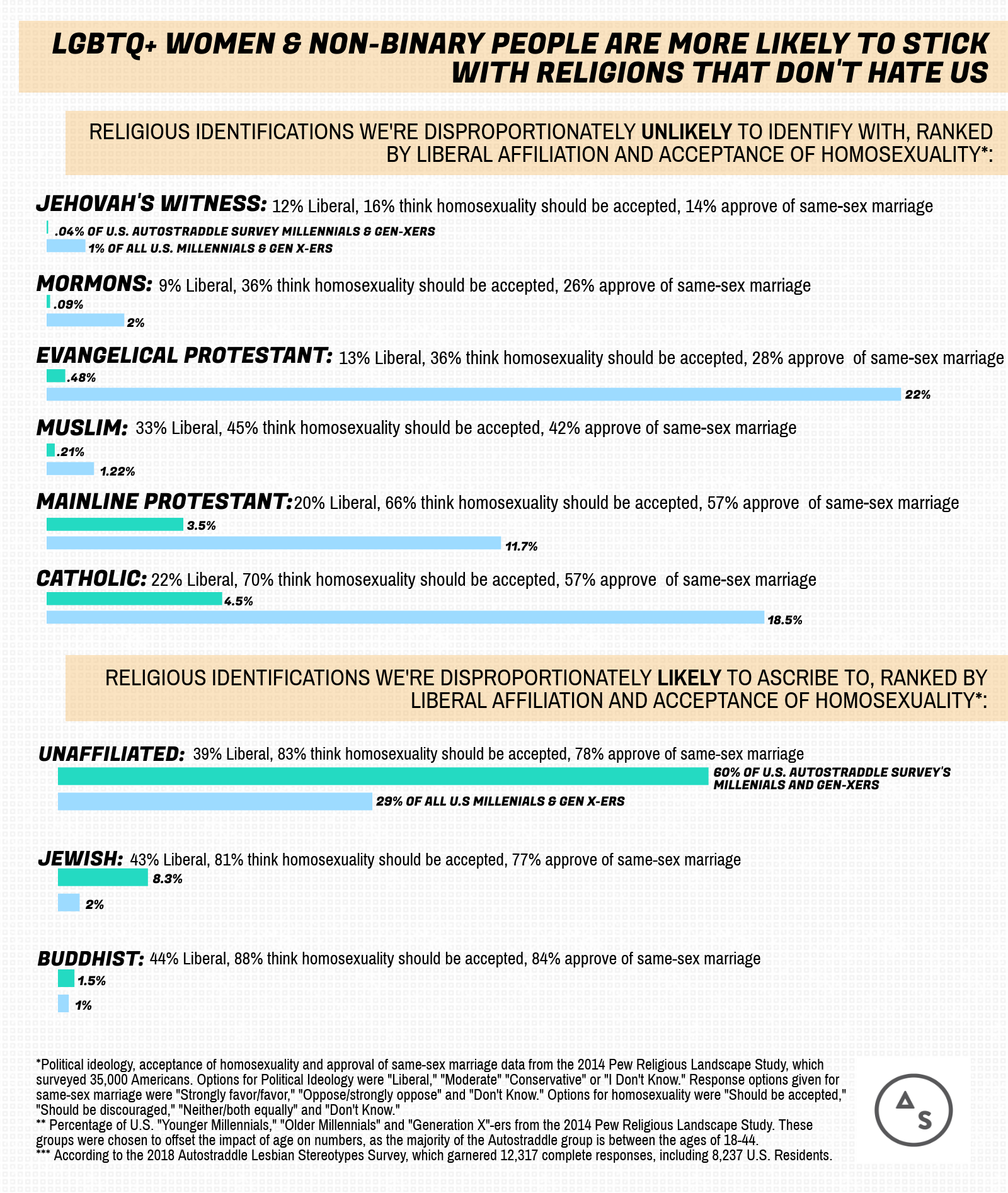
Another fascinating tidbit for you: the LGBT Pew Survey asked survey-takers for their perception of various religion’s friendliness towards LGBT people. In order of perception of friendliness, from least friendly to most, the results were:
- Muslim Religion (84% of LGBT people think this religion is unfriendly to LGBT people)
- Mormon Church (83%)
- Catholic Church (79%)
- Evangelical Churches (73%)
- The Jewish Religion (47%)
- Non-Evangelical Protestant Churches (44%)
But if you look at Pew’s Religious Landscape Study survey and the percentage of faith adherents who think homosexuality should be discouraged, that list would go like this:
- Mormon Church (57% think homosexuality should be discouraged)
- Evangelical Protestant (55%)
- Muslim Religion (47%)
- Non-Evangelical Protestant Churches (26%)
- Catholic Church (23%)
- Jewish Religion (16%)
There’s some huge disparities here but let me say first that the Pew Religious Landscape survey was a survey of individuals sharing their personal feelings on the acceptance of homosexuality, which isn’t necessarily the same as the position of the church or faith they belong to.
Still, it’s truly bananas that Mormonism and Evangelical Christianity, which are quite explicitly homophobic, would not be clocked as the least friendly faiths, or that Judaism would be perceived as more homophobic than mainline Protestant faiths. I’m also curious how much Islamophobia played in to these rankings. That being said, mainline Protestant does include a lot of faiths that are LGBT-friendly, and it’s quite possible those who ranked it as not unfriendly are members of those groups — Episcopalian, for example, as well as Quaker / Religious Society of Friends, Lutheran and The Metropolitan Community Church. You’re not the only queer Christian.
![]()
Here’s What We Do Believe In, Though
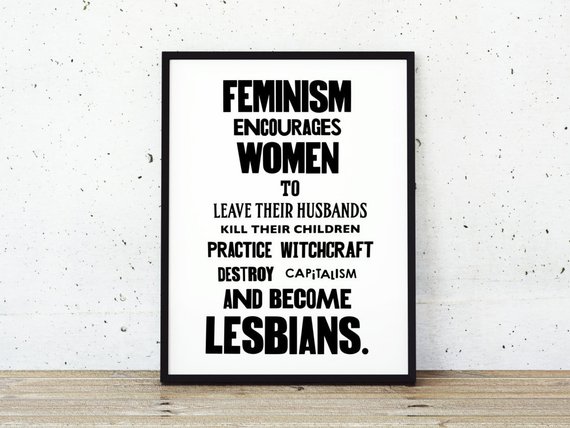
Basically everything Pat Robertson said about us was true, and I’m very proud of everybody here. Next week, we’re gonna talk about other spiritual and supernatural things. Here’s a fun fact: when asked, “Do you believe in astrology — that the position of the stars/planets can affect people’s lives?”, 28% of y’all said yes.






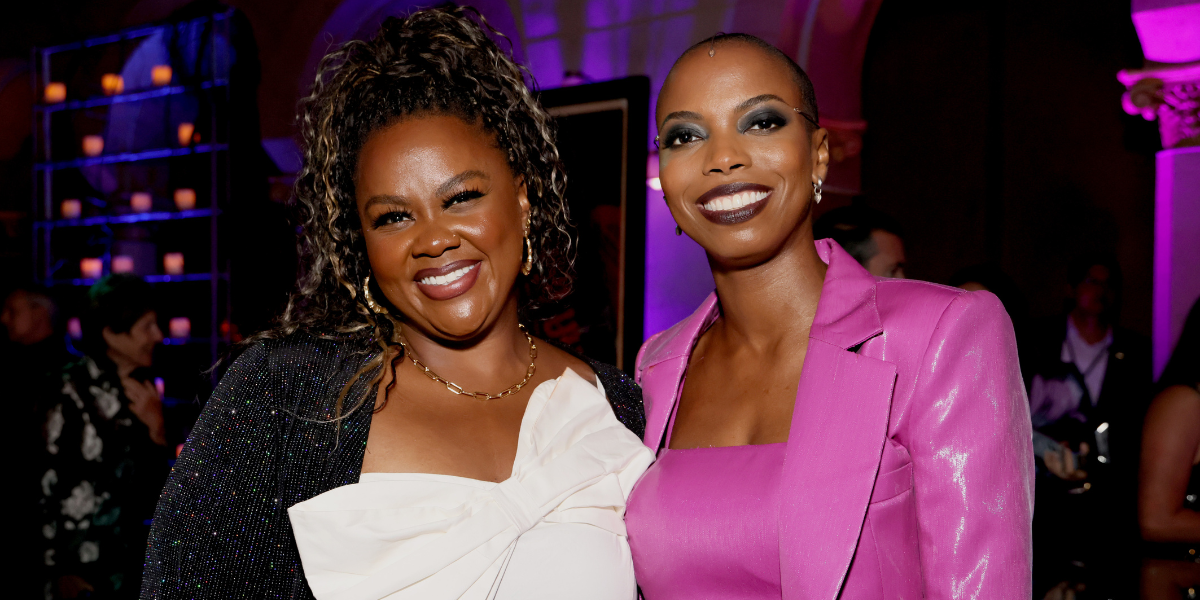
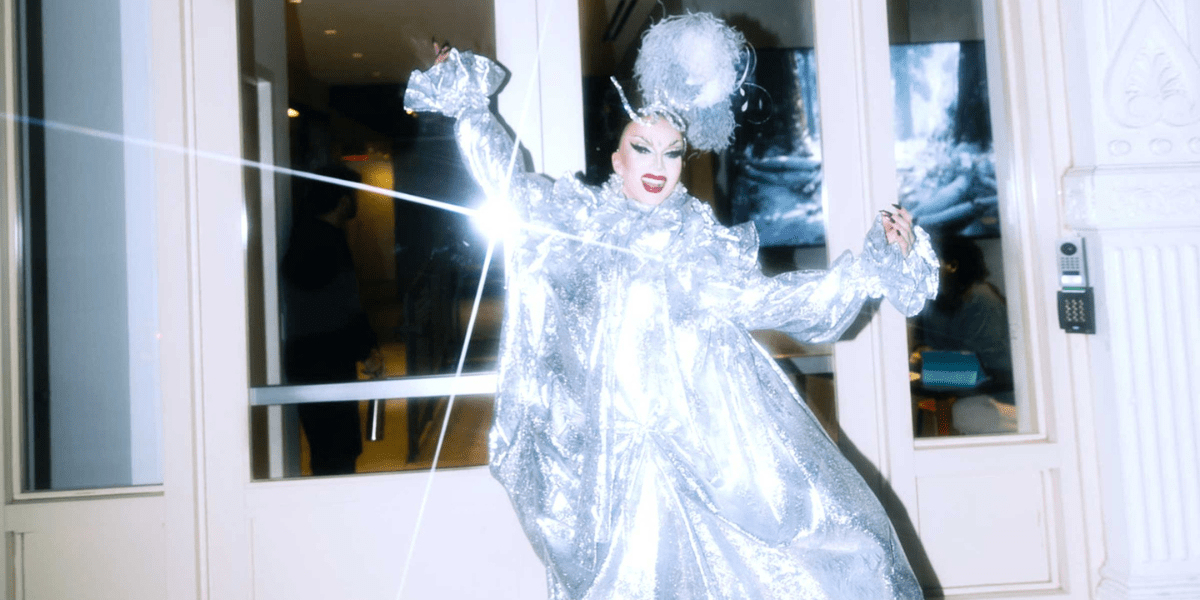
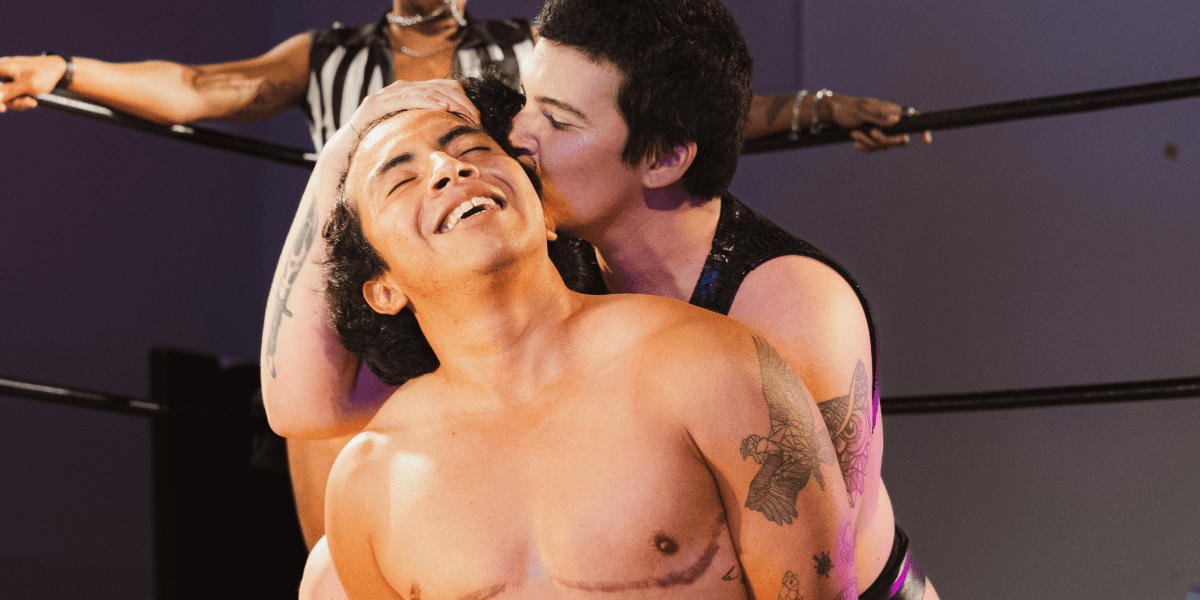
Comments
Only 28%? Whyyyyy does it feel more like 82% IRL? :sob:
Riese, this right here is why I hope you consume all necessary vitamins and get plenty of sleep because you must live forever.
“Before I get into the religious laundry list, note that I’m not a religious scholar by any means, and therefore will probably get things wrong! Please correct me in a manner that could be described as kind, tenderhearted, and forgiving, as surely G-d has forgiven you for your trespasses.”
This. I copied this same exact paragraph to highlight in the comments!
(You are awesome Riese!! You and your work is a blessing on all of us).
THANKS GUYS!!!
That and
“I’m just the messenger, otherwise known as “the prophet.” In this metaphor, Pew is god. Here’s what Pew has deemed right and just upon us.”
Wonderful writing. :)
Reise, I’m not sure if you have any background in data analysis, but you’ve done a great job discussing the limitations of this data set and running some comparisons with other data sets without making it so technical that people lose interest. I find a lot of online articles that cite studies of 25 people and don’t discuss limitations, so it’s super easy to extrapolate that to the whole population! Or worse, make conclusions that the data doesn’t at all support. My only (small) suggestion is to say something about how it’s not random sampling and what that limits. Just wanted to say thank you for your analysis! These studies are really informative and interesting, and they help fill a big gap in research.
This sentence is in there: “This survey was conducted by soliciting participants via Autostraddle.com, so it was self-selecting and not a random sample.”
Or maybe it was added after you read it?
yes i added that after getting this comment
good call — i hadn’t mentioned it because i felt like it was obvious, but i also forget that people come to read these pieces who don’t normally read autostraddle and that i should have something like that in there. i will add it!
and yeah i don’t _really_ have a background in statistical analysis or data analysis. i did almost do a double major in sociology in college (which was like, 15 years ago), and took a basic statistics class that i genuinely hated so i took it pass/fail to not impact my GPA. honestly i remember it just being about how to present small sample sizes as valid enough to draw conclusions from? i was like… why are we doing this, just get a bigger sample…
but i’ve always enjoyed reading studies and read a lot of data analysis my first few years of writing here that i’ve just, i guess, picked up things from! i think the main thing is that i’m genuinely curious about these topics, so if i follow my curiosity, interesting things can turn up.
anyhow thank you!!
This is sooo interesting. I love the section about queer women and religions that do and don’t actively hate us – not surprising, but so interesting. I want to know more. I’m curious how the Mainline Protestant denominations would break down – since there’s such a wide range and some are officially affirming and some are not and some kind of vary by congregation.
Jew here, just coming down to say, yay Judaism! And yay for all the other Jewish Straddlers! And yay to Riese & Co. for making the Straddleverse a safe and welcoming place for Jews in a time where the real world increasingly feels less safe and welcoming for us than it has in a long time.
Was coming here to celebrate the Jewish Straddlers as well! *high five*
As a fellow Jew I second this.
Also came down to say yay Jews! I love how disproportionately we are represented in the lgbt community ?️?✡️
Basically I read this entire post for the kicker but HEY 28% OF FOLKS YOU ARE MY PEOPLE HI HELLO
This was GREAT. I treat Emergent Strategy like some people treat the Bible. I open to a random page when I am lost and have not yet been failed, I hand out free copies, and I send quotes to friends in distress.
I love Emergent Strategy! I feel this way about Joyful Militancy as well, if you haven’t read it you would probably like the overlap between the two books
As one of the Discordians who answered the survey (if there are more than one): It’s not quite accurate to call Discordianism a “parody religion”. I mean, it is that, but it’s also not. It’s complicated.
I was impressed that Pew listed Discordianism as a religion at all. But I agree, it’s so much more than a parody. Something like the Church of the Subgenius, or Pastafarianism, THAT is a parody religion.
Then again, don’t believe anything you read!
they didn’t! the “other” section is just write-in answers from the autostraddle survey, and me explaining them. none of those came from the pew survey.
I *am* a scholar of religion (and of Judaism specifically), so I shall provide what I hope is appropriately gentle correction:
“The Judeo-Christian God” is not a thing. “Judeo-Christianity” is not a thing and has not been a thing since the end of the first century CE, at which point the sects that became Rabbinic Judaism and Christianity started to diverge sufficiently to be called distinct religions rather than sects of Second Temple Judaism.
“Judeo-Christian” is a term used by a Christocentric culture to simultaneously appropriate and subordinate Judaism within an ultimately supersessionist narrative. It papers over real and *significant* theological, ritual, textual, social, and interpretive differences between Judaism(s) and Christianit(ies), let alone differences along these lines *among and within* Judaisms themselves. And note that it excludes Islam(s)–which is also monothestic, and for which both the Hebrew and Greek Bibles are true Divine revelations–from this apparent monotheistic fellowship.
Really, it is best to talk about Judaism(s), Christianit(ies), and Islam(s) as the distinct and valid traditions that they are; if you must use a catch-all term, “the Abrahamic traditions” is preferable.
Thank you for this. I too had a bit of an issue with that term. I have mentioned it before here(in more simple terms) and autostraddle has been great to adjust their wording of it.
I came here to say this. Thanks for saying it more academically and patiently and gently than I would have!
ok — should i change the headline to say “Abrahamic God”? would that be accurate?
No, because there isn’t a single account of God shared between the three Abrahamic religions (or even within any one of them). To be frank, the way the questions were framed (and I’m not blaming you here, I’m blaming Pew, which has had some long-running and unacknowledged Christocentrism–for which read, really, white US Protestant-centrism–going on in its survey designs), the God they’re referring to is a very particular account of such from the aforementioned white US Protestantism.
Honestly, I’d just say “God.” Yes, it’s less specific, but it points to a single Divine entity Who is discrete from the rest of existence in some way (rather than, say, some form of spiritual energy that may or may not infuse the rest of existence), which is what I suspect you mean to begin with.
Hm, okay.
I was gonna just say “God” but then I was like, I can’t REALLY say that with certainty since we didn’t ask directly. So I spent a few hours applying Pew’s percentages of people of each faith who believe in G-d to the number of people we had ascribing to each faith, but then had to sort out what “God” means because some people who are polytheistic still say they believe in G-d, and then also, Pew showed like the majority of people who picked “Nothing” believing in G-d? And then my head exploded and I didn’t know what to do so I made it specific to Christianity and Judaism. I’d alway thought Judeo-Christian was a word that existed to account for the fact that both faiths believe in the G-d of the Old Testament. This is all very interesting!
I mean, just saying “God” makes for a punchier headline, I’m just not sure if it’s accurate?
I certainly can see how the terminology can be confusing, and I do appreciate your willingness to edit after the fact.
I LOOOOOOOOOOOOOOOOVE AS.
You can always find a constructive debate here. Thank you all for existing
Muslims worship the same God.
Yes!! I found out a while ago (I think from one of Joel Derfner’s books) that “Judeo-Christian” was a term popularized as a result of WWII so people wouldn’t sound as anti-Semitic/like Nazis when they talked about America’s Christian Values, pretty much. The wiki quote I found on this is: “Promoting the concept of United States as a Judeo-Christian nation based upon Judeo-Christian ethics first became a political program in the 1940s, in response to the growth of anti-Semitism in America.”
Thanks so much for this! I never knew this term was problematic (for the very reason that it is—Christianity/Protestantism running over all faith traditions in the US). I’m also very glad to have the “Abrahamic traditions” phrase to refer to Judaism/Christianity/Islam… because now that i think about it, it’s really strange to refer to the monotheistic religions that came from that chunk of the world, but not include Islam. Thank you, thank you for teaching me something today!
Speaking as a Pagan, we are a group of faiths which trend female, so as a site of predominantly women, you are going to get a lot of Pagans. I am honestly surprised if anything it is so low. Especially given that it tends to be pretty open to queer women. It’s also a group of faiths growing quickly, so I figure it may be higher in the future. I’ll also toss in I have a grad degree so not sure how far that skews things.
I majored in religion in undergrad, so I found this really really interesting, and I appreciate you breaking it down like this.
That’s an interesting point, I wonder if it would have been worth comparing with results from just women in the Pew studies in addition to the general population.
I mean we definitely had like, ten times more Pagans than the Pew study did!
Pew did provide gender-specific data, but not down to that level — it just did the denominations of Christianity, Buddhism, Judaism, Hindu, non-believers and then everything else. Also I can’t separate it out by gender AND age, so i’d be comparing a group that’s mostly between 18-44 (ours) to a group that is mostly between 50-64 (theirs) so that’s why i didn’t do any gender comparisons.
Was there a break down in terms of religion and cultural background? Like I know that West Asian Jews in general are less likely to be lgbtq accepting, due to various cultural factors. Were you able to find anything of that sort in the survey were certain ethnicities and/or cultures buck the inclusivity trend of that religion?
do you mean in our data? we didn’t have enough people from countries besides the U.S. to really draw any conclusions, and the pew data i was looking at was all U.S.-based. they have done world-wide studies of certain religious things but i’m not sure if they’ve asked about LGBT acceptance.
Well, either data. I didn’t necessarily mean from other countries as a simple ethnicity question might have sufficed. Like your numbers for Jews show one thing, but again the West Asian community I’m part of in L.A. shows me otherwise.
shout out to west Asian queer jews!
relatedly, I want everyone to see this so bad:
https://youtu.be/VsGJX631-Tg
Why, I’m one of the non-christian Quakers what up!
Hello, fellow non-Christian Quaker and possibly (looking at your profile) fellow Iowa resident? Do I know you? If not, I feel like I should?
Me too, hi!
I always enjoy your statistical analysis of our survey results, Riese. I love learning more about my community and your synthesis of the data is accessible and engaging.
I’m so used to living in a country with an overwhelming Catholic majority, I sometimes forget there’s such a myriad of Christian faiths. it’s super interesting to read about places with a different religious breakdown, thank you for this!
Hiya there, I’m one of those atheist with “fuck religion” on the side
So you’re like an atheist with benefits?;-)
Comment award
I am SO jealous of americans because if you’re a christian, you can actually choose wich church you want to be a part of !!
I live in a country who is mostly secular/atheist, but when it comes to christianity, you don’t get a choice : it’s catholic or nothing. I live in the 4th city by size/number of people in the whole country and there is maybe four or five protestant churches (including evangelicals, lutheran, african churches), and you gotta be ready to walk a lot to go there.
(i love complaining about that when protestantism will never be superstitious enough for me – I tried going to a protestant church and it was booooring and very serious, but still I wish I had some kind of choice when I converted)
The grass is always greener.?
Those of us who’ve never had a physical religious community of any sort are pretty jealous of the idea of having a building and meeting a co-religionist in real-life without travelling internationally for some major event, never mind having multiple options.
I tried to look into the anglican church. I’m in Toulouse, and they have some meeting there, but damn, I could not stand the idea of having like, 4 parish in the whole country ? Community is so important in catholicism, once you’ve tasted it, it’s hard to leave it behind. I guess not having a a community can be better in a way, in the sense that you get to focus in your spiritual life, and not on externals ?
This is really interesting; I was raised outside of any religious institution. My family has ended up getting involved in Jewish life in the past decade and I have a taste of the community now. It’s really been wonderful to be a part of! I am not a spiritual person at all; I can’t wrap my mind around things that can’t be seen or proven. But I go to services and have enjoyed holidays, etc… so I’m religious but just for the community really!
It’s interesting that there are significant numbers of people who identify as some variation of lapsed/former/culturally Jewish and Catholic, who emphasize that Catholicism and Judaism inform their identities even if they aren’t religiously observant, while it looks like most former/lapsed non-evangelical Protestant folks have the ability/tendency to just walk away without acknowledging their upbringing/cultural identity. Or maybe there are cultural Lutherans who I am failing to see?
I have made jokes about identifying as a “cultural Lutheran” before to lampshade/explain my passive aggressive tendencies and love of mayonnaise – but also, I think it has something to do with Protestant Christianity being the dominant religious group in North America. Protestant culture is kind of the unmarked case (even if there is variation between sects) so it doesn’t feel as individual and there’s not a need to maintain your connection to your people, since being raised in a Protestant religion doesn’t necessarily mark you as “other”
I agree with this. I’m pretty aware of the impact of my WASP heritage (because I’m only half WASP) but I find that when I talk about it with fellow WASPs they’re pretty unused to thinking of themselves as having a specific heritage instead of just being normal American.
And I see my WASP heritage as just one more piece of my identity. Because my dad’s family is (Italian and Croatian) Catholic and my mom’s is WASP Episcopalian – my mom mostly socialized me but I was way closer to my Catholic grandparents than my Protestant/Episcopalian ones. Same for the cousins / extended family.
Clarification- WASP = white Anglo Saxon Protestant, aka English
True! This is very American-focused too. Various atheist friends of mine from Catholic majority countries/areas do not feel the need to identify as former Catholics in the way Americans do. They engage with Christian holidays and traditions in the way that ‘cultural Lutherans’ do.
Very much yes to the dominant religious group thing.
There were various super fun Anglo-Protestant “nativist” movements baring strong anti-catholic sentiment mixed in with ethnic prejudices so like if your Catholic ancestors didn’t have festivals, or feast days with food and activities associated with a significant saint(s) that already provided a sense of cultural identity the “nativist” sentiments would do it.
In South there was the KKK who still (to my knowledge) exclude Catholics from membership and of course the Baptists who found wine with Sunday dinner to be very offensive among other things.
And then the “settling” of Florida and the Southwest by White Protestants was also an ugly racist messy business. The Northeast had the anti-Irish (and was home to the first “nativist” movements) asshattery before the influx of Italians and Polish so that colored their perception of Catholics.
My father was from the Northeast and his mother believed my Cajun-Sicilian confirmed(that means fully invested adult not just baptisted into it) Catholic mother would saddle him with a new baby every year and that JFK took orders from the Pope as barometer of how things were.
I am one of those former Lutherans/now atheists who responded to the survey (although my particular branch of Lutheranism is fiercely evangelical, which may have colored my perception of religion a bit more negatively)…
I guess I don’t know what it would mean to be culturally Lutheran though. I still celebrate Christmas, but that’s not a uniquely Lutheran or even Protestant thing. Reformation day was our only special holiday, but even that was just the regular Sunday service with a few Martin Luther hymns thrown in. And I really dislike sauerkraut! But I think the other commenters are right, there is nothing really uniquely “other” about Protestantism (at least, not in the midwestern US).
how likely is God to believe in astrology?
;)
Or Vice Versa?
Ex-Rosicrucian here. Never yet met another queer one.
Anyone? Anyone???
I’m not Rosicrucian, but I just learned about them recently and have been very curious about how women/queers/basically not hetcis white men fair in their religion
Hey Liz!
I should first say there’s several completely unrelated groups that are called Rosicrucians. I think the best-known in the US is Amorc, which I know basically nothing about other than it exists. I was part of a smaller group based out of Holland, with only around 50 (!) members in the UK, called the Golden Rosycross.
For that particular group growing up ( although I think things have changed now), at that time being queer was not OK, being female was mostly equal and it was extremely multicultural (there were in our group maybe 5 anglos out of 50?).
That’s a super brief summing up. For me my greatest challenge irt having grown up in that religion has been the ability to be aware of and acknowledge my own desires, of all kinds.
Thanks for sharing your experience, tho the outcome of being disconnected with your desires is def not good. I was specifically thinking of AMORC, but generally surprised to hear Rosicrucianism mentioned at all. I grew up Lutheran, then Catholic and am now happily atheist, but am interested in learning more about spiritual alchemy. I’ve been looking for someone to chat with about it, but don’t want to 1) be appropriative or 2) end up interacting with a bunch of white hetcis dude bros (the intellectualism around AMORC just makes me skittish around the second point). Lol. Not that I’m looking for you to solve any of this! Those are just all my cards on the table. And thanks again for sharing
I’m over here giggling that Pew categorizes Paganism—a multiple millennia old faith tradition—as a “New Age Religion”
I think you buried the lede a wee bit because I was fully expecting to read about our astrological beliefs in this article, but I love love all of the data breakdowns that you do, Riese, almost as much as I love participating in the surveys!
My only other comment is that I felt kind of boxed in in terms of fully encapsulating how I identify on the survey – I would describe myself as non-believing Orthodox Christian because my entire cultural identity and community revolves around the Church, but I don’t really believe in the spiritual or religious elements of what that Church stands for. I guess there isn’t a large enough population for us to be seen as a separate group, and I can definitely attest that I don’t have the same shame and guilt that comes up with being an ex-Catholic.
yeah that makes sense — i wanted to be able to make direct comparisons between this population and the pew survey, so i replicated their questions. i think surveys always make people boxed in somehow — but i think yeah i could’ve offered a matrix of options (like you could check off “current” or “former” or something) that’d still enable me to make a comparison.
the problem with making write-in answers more of a thing is that going through an categorizing all the “other” answers and then accounting for them every time i do another calculation probably adds another 12 hours of work for me, which was definitely true this time.
Thanks for your response! I definitely understand the limitations in survey questions, especially when making it a direct comparison to something else. The hets are too reductive, really.
YES ATHEISM
I’m a bit confused about the breakdown between “Nothing,” “I don’t know,” and Unaffiliated/Atheist or Agnostic. I kind of thought atheism was as far from religious belief as one could get (although I have certainly met atheists who were very zealous/dogmatic about their beliefs). But maybe “Nothing” is the least-possibly-religious choice?
I’ve wondered this before in a different context (and I can’t remember where or when, maybe a college class?) and I think what I read/heard was that atheism was still a belief/faith in the fact that there is no God, vs. “no religion” or in this case, “nothing,” which would be a lack of belief/faith. Idk if this is clear or answers your question though.
Hare Krishna (vaishnava) here! Any others?
Also, wondering what is the overlap of religious people who also believe in astrology? …side note astrology is a part of Hare Krishna religion in a way, so wondering if some religions are more likely to accept or believe in astrology?
Reading some of the other comments – thought I’d add that Hare Krishna/Krishna Consciousness/vaishnava religion also believes in one God (Krishna) but its important to add that Krishna is just one name for God. We believe God can take any form or name He(she) chooses… to be able to reach the hearts of all living entities. So we also accept other names of God, and other religions. I’ve known many HK devotees who also actively practice or study the religion they were raised with along side with Krishna Consciousness. So now I’m wondering if that is something that happens with other faiths as well?
Anyways, that’s enough for my ramble! Great article as always, thanks Riese!
Oh… also wondering if theres a way to group or link all the survey articles together? I don’t want to miss one!
https://develop.autostraddle.com/tag/autostraddle-lesbian-stereotype-survey/
Queer pagan witches unite!
I am very happy today with my family. My name is rose sarah living in USA, My husband left me for a good 3 years now, and i love him so much, i have been looking for a way to get him back since then. i have tried many options but he did not come back, until i met a friend that darted me to Dr.Jude a spell caster, who helped me to bring back my husband after 2 weeks. Me and my husband are living happily together today, That man is great, you can contact him via email liberationlovespell@gmail.com… Now i will advice any serious persons that found themselves in this kind of problem to contact him now a fast solution without steress.. He always hello, now i call him my father.contact him now he is always online email (liberationlovespell@gmail.com) or contact him on his whatsapp mobile line +2348034062173
As a Jewish queer person, I feel like a lot of the intended queer-friendly christian theology I’ve heard throws all theologically homophobia into the “Old Testament” and argues that Christianity isn’t about that. Sometimes it can come off in ways that feel like its throwing the Torah under the bus as the actually homophobic text, and that rhetoric is common enough that I wonder if that’s why the perception of Jews as generally homophobic is so much worse than how many Jews actually are homophobic.
In general in a very Christian-normative country (at least in my experience living in the US all my life) Judaism can be seen as an earlier/older form of Christianity, which would explain why it’s seen as more conservative. This is actually inaccurate to Judaism, however, as there are fundamental theological differences between Christianity and Judaism. It’s also possible that Orthodox Jews are overrepresented in non-Jews’ perceptions of Jews.
Jews are possibly at least partially homophobic at much lower rates because we have a very different relationship with our religion and holy texts, so that kind of perception/argument from a Christian lens doesn’t really apply to us, but people don’t know that unless they’re pretty familiar with Judaism.
(And most non-Jews are not familiar with Judaism, especially in America. If you don’t know how familiar you are with Judaism, here is a basic guideline: if the only holidays you know about are Hanukah and maybe Passover then you are very, very uninformed. Being informed on a religion that isn’t yours doesn’t have to be a priority in your life, but its good to know when you are.)
Just some conjecture based off of anecdotal evidence on why the perception and reality of Judaism is so off.